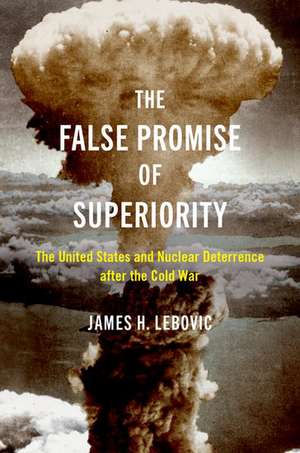The False Promise of Superiority: The United States and Nuclear Deterrence after the Cold War
Autor James H. Lebovicen Limba Engleză Paperback – 13 mar 2023
Preț: 142.02 lei
Preț vechi: 162.67 lei
-13% Nou
Puncte Express: 213
Preț estimativ în valută:
27.18€ • 29.61$ • 22.90£
27.18€ • 29.61$ • 22.90£
Carte disponibilă
Livrare economică 22-28 martie
Livrare express 19-25 martie pentru 46.85 lei
Preluare comenzi: 021 569.72.76
Specificații
ISBN-13: 9780197680872
ISBN-10: 0197680879
Pagini: 288
Ilustrații: 9 b/w line drawings; 2 tables
Dimensiuni: 236 x 154 x 17 mm
Greutate: 0.42 kg
Editura: Oxford University Press
Colecția OUP USA
Locul publicării:New York, United States
ISBN-10: 0197680879
Pagini: 288
Ilustrații: 9 b/w line drawings; 2 tables
Dimensiuni: 236 x 154 x 17 mm
Greutate: 0.42 kg
Editura: Oxford University Press
Colecția OUP USA
Locul publicării:New York, United States
Recenzii
James Lebovic's The False Promise of Superiority is a real breath of fresh air that makes a vital contribution to ongoing debates about nuclear strategy, especially the nature, meaning and significance of nuclear 'superiority.' Challenging approaches to nuclear strategy that rely on capabilities rather than intentions and real-world decision-making dynamics, Lebovic makes a compelling case that nuclear strategists and policy makers should focus on what potential adversaries are likely to do as opposed to what they can do. No one interested in the future of nuclear deterrence and strategy can afford to ignore this provocative and important book.
James Lebovic provides an unsparing examination of lessons learned and unlearned from debates about nuclear deterrence during the Cold War. More importantly, he demonstrates why these debates are relevant today as the United States struggles to deal with the nuclear challenges posed by Russia, China, Iran, and North Korea. At a time when most analyses of nuclear deterrence and strategic stability focus on the impact of emerging technologies, Lebovic focuses on the underlying logic of how deterrence works and makes a strong case that capabilities matter much less than commonly supposed. His analysis is a useful antidote to the current fascination with how artificial intelligence, hypersonic missiles, and cyber weapons will revolutionize deterrence.
The False Promise of Superiority is an important book that reminds readers how the faulty logics and irrationalities of the Cold War era continue to haunt the present.
James Lebovic provides an unsparing examination of lessons learned and unlearned from debates about nuclear deterrence during the Cold War. More importantly, he demonstrates why these debates are relevant today as the United States struggles to deal with the nuclear challenges posed by Russia, China, Iran, and North Korea. At a time when most analyses of nuclear deterrence and strategic stability focus on the impact of emerging technologies, Lebovic focuses on the underlying logic of how deterrence works and makes a strong case that capabilities matter much less than commonly supposed. His analysis is a useful antidote to the current fascination with how artificial intelligence, hypersonic missiles, and cyber weapons will revolutionize deterrence.
The False Promise of Superiority is an important book that reminds readers how the faulty logics and irrationalities of the Cold War era continue to haunt the present.
Notă biografică
James H. Lebovic is Professor of Political Science and International Affairs at The George Washington University. He has published widely on defense policy, deterrence strategy, arms control, military budgets and procurement, foreign aid, democracy and human rights, international organizations, international conflict and cooperation, and military intervention. He previously authored six books including Planning to Fail: The US War in Vietnam, Iraq, and Afghanistan (Oxford, 2019), Flawed Logics: Strategic Nuclear Arms Control from Truman to Obama (2013), The Limits of US Military Capability: Lessons from Vietnam and Iraq (2010), and Deterring International Terrorism and Rogue States: US National Security Policy after 9/11 ( 2007). From 2015-2017, he chaired the International Security Studies Section of the International Studies Association.
